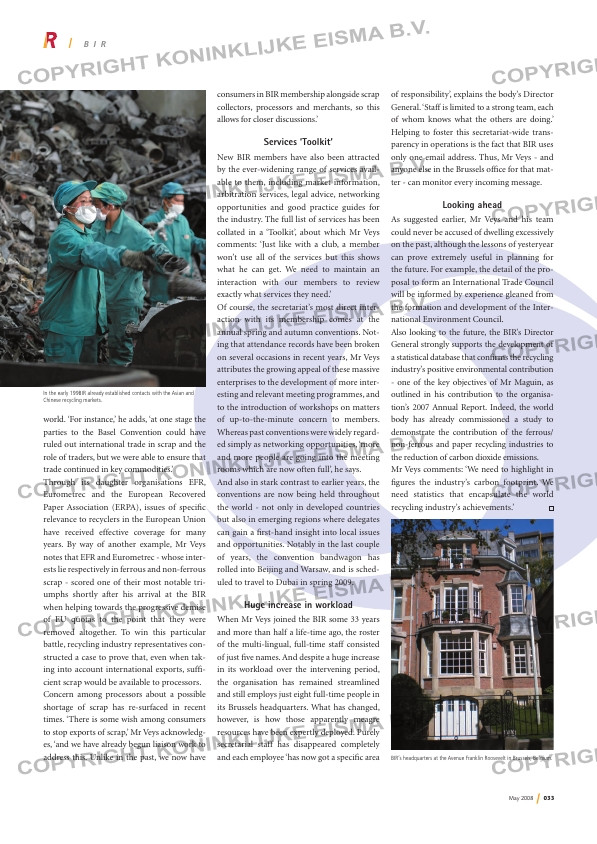Page 33 from: May 2008

May 2008 033
world. ‘For instance,’ he adds, ‘at one stage the
parties to the Basel Convention could have
ruled out international trade in scrap and the
role of traders, but we were able to ensure that
trade continued in key commodities.’
Through its daughter organisations EFR,
Eurometrec and the European Recovered
Paper Association (ERPA), issues of specifi c
relevance to recyclers in the European Union
have received effective coverage for many
years. By way of another example, Mr Veys
notes that EFR and Eurometrec – whose inter-
ests lie respectively in ferrous and non-ferrous
scrap – scored one of their most notable tri-
umphs shortly after his arrival at the BIR
when helping towards the progressive demise
of EU quotas to the point that they were
removed altogether. To win this particular
battle, recycling industry representatives con-
structed a case to prove that, even when tak-
ing into account international exports, suffi –
cient scrap would be available to processors.
Concern among processors about a possible
shortage of scrap has re-surfaced in recent
times. ‘There is some wish among consumers
to stop exports of scrap,’ Mr Veys acknowledg-
es, ‘and we have already begun liaison work to
address this. Unlike in the past, we now have
consumers in BIR membership alongside scrap
collectors, processors and merchants, so this
allows for closer discussions.’
Services ‘Toolkit’
New BIR members have also been attracted
by the ever-widening range of services avail-
able to them, including market information,
arbitration services, legal advice, networking
opportunities and good practice guides for
the industry. The full list of services has been
collated in a ‘Toolkit’, about which Mr Veys
comments: ‘Just like with a club, a member
won’t use all of the services but this shows
what he can get. We need to maintain an
interaction with our members to review
exactly what services they need.’
Of course, the secretariat’s most direct inter-
action with its membership comes at the
annual spring and autumn conventions. Not-
ing that attendance records have been broken
on several occasions in recent years, Mr Veys
attributes the growing appeal of these massive
enterprises to the development of more inter-
esting and relevant meeting programmes, and
to the introduction of workshops on matters
of up-to-the-minute concern to members.
Whereas past conventions were widely regard-
ed simply as networking opportunities, ‘more
and more people are going into the meeting
rooms which are now often full’, he says.
And also in stark contrast to earlier years, the
conventions are now being held throughout
the world – not only in developed countries
but also in emerging regions where delegates
can gain a fi rst-hand insight into local issues
and opportunities. Notably in the last couple
of years, the convention bandwagon has
rolled into Beijing and Warsaw, and is sched-
uled to travel to Dubai in spring 2009.
Huge increase in workload
When Mr Veys joined the BIR some 33 years
and more than half a life-time ago, the roster
of the multi-lingual, full-time staff consisted
of just fi ve names. And despite a huge increase
in its workload over the intervening period,
the organisation has remained streamlined
and still employs just eight full-time people in
its Brussels headquarters. What has changed,
however, is how those apparently meagre
resources have been expertly deployed. Purely
secretarial staff has disappeared completely
and each employee ‘has now got a specifi c area
B I R
In the early 199BIR already established contacts with the Asian and
Chinese recycling markets.
of responsibility’, explains the body’s Director
General. ‘Staff is limited to a strong team, each
of whom knows what the others are doing.’
Helping to foster this secretariat-wide trans-
parency in operations is the fact that BIR uses
only one email address. Thus, Mr Veys – and
anyone else in the Brussels offi ce for that mat-
ter – can monitor every incoming message.
Looking ahead
As suggested earlier, Mr Veys and his team
could never be accused of dwelling excessively
on the past, although the lessons of yesteryear
can prove extremely useful in planning for
the future. For example, the detail of the pro-
posal to form an International Trade Council
will be informed by experience gleaned from
the formation and development of the Inter-
national Environment Council.
Also looking to the future, the BIR’s Director
General strongly supports the development of
a statistical database that confi rms the recycling
industry’s positive environmental contribution
– one of the key objectives of Mr Maguin, as
outlined in his contribution to the organisa-
tion’s 2007 Annual Report. Indeed, the world
body has already commissioned a study to
demonstrate the contribution of the ferrous/
non-ferrous and paper recycling industries to
the reduction of carbon dioxide emissions.
Mr Veys comments: ‘We need to highlight in
fi gures the industry’s carbon footprint. We
need statistics that encapsulate the world
recycling industry’s achievements.’
BIR’s headquarters at the Avenue Franklin Roosevelt in Brussels, Belgium.
RI_085_BIR.indd 5 14-05-2008 16:26:04



